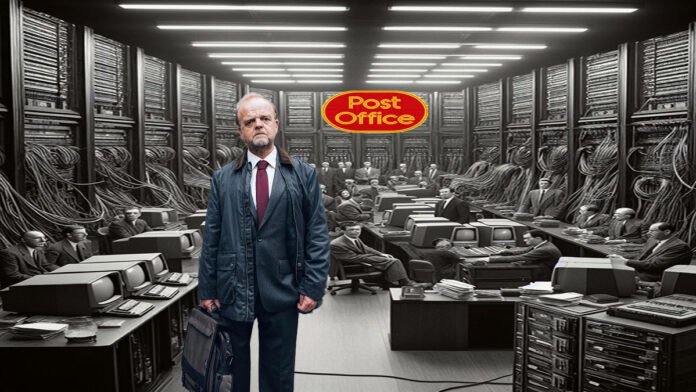The Post Office IT Scandal: A Story of Ruined Lives and Evaded Accountability
The Post Office Horizon scandal represents one of Britain’s greatest miscarriages of justice. For over 20 years, hundreds of postmasters were wrongly prosecuted and even jailed due to flaws in a computer system they did not understand and could not control. This callous indifference to the accuracy of digital evidence and presumption of guilt over innocence ruined livelihoods and shattered families. Yet years later, those responsible still evade consequences.
In 1996, the Post Office began implementing the Horizon IT system developed by ICL, later Fujitsu, to integrate social security payments through its branches. By 1999, the rollout had begun causing discrepancies in postmasters’ accounts. But the Post Office blamed branch workers, forcing them to make up supposed shortfalls or face prosecution for theft and false accounting.
Many, denied due process and unable to fight the opaque system’s numbers, pled guilty under threat of harsher punishment. Some who protested innocence lost everything – businesses, homes, reputations – paying back “debts” they did not owe or serving jail time for crimes they did not commit. The human toll was immense, with bankruptcies, broken families, psychiatric damage and suicide among the effects.
Yet the Post Office refused to acknowledge flaws in Horizon, instead pursuing prosecutions into 2015. Only in 2019, after losing a High Court case proving Horizon’s defects, did it finally concede the scandal’s scope. By then, irreparable damage had long been done.
The postmasters eventually won a lawsuit establishing Horizon’s role in their convictions. But the Post Office, claiming it could not afford further compensation, insisted the payments made were “full and final.” The government, 100% shareholder in the Post Office, refused adequate redress despite pleas from victims and MPs. An ongoing public inquiry seeks answers, but is far from quick closure for those whose lives were ruined.
This outrage illuminates systemic failings. The legal system presumes computer records are infallible unless definitively proven otherwise – a naive view exposing the ignorant to catastrophic injustice. Providers must demonstrate responsible system management, not make unreliable digital evidence appear unimpeachable to juries.
A History of IT Failures Ruining Lives While Governments Cover Up
The Post Office Horizon scandal adds to a litany of botched government IT projects that have destroyed innocent lives. When systems fail, bureaucrats dig in – denying responsibility, protecting careers, abandoning those harmed.
The Post Office is far from an isolated case. We need only look at the NHS’s £26 billion IT failures under Labour in 2010. Ministers hailed the initiatives as progress while costs spiralled and deadlines were missed. Parliament slammed the projects as fundamentally flawed exercises in incompetence.
Or Black Monday in 1987 – when poorly understood new trading software triggered astronomical market losses in hours. Traders watched helplessly as the programs they scarcely grasped cratered pensions and savings. Yet lessons about managing technology risks were ignored.
In each instance, average people suffered life-changing loss from systems beyond their control. But those responsible evaded consequences, protected by layers of bureaucracy.
As technology accelerates, so does potential for catastrophic failure. But governments prize image over integrity, concealment over transparency. Admitting flaws means accountability – and that is avoided at all costs.
Humanity vs. Machines: Rethinking Accountability in the Age of Technology
It is telling that in May 2021, the British Computer Society, the official governing body for IT professionals in the UK, urged a reconsideration of the courts’ default presumption that computer data is infallible.
The prevailing assumption that computer evidence is inherently correct stems from a simplistic understanding of software systems. Given the intricate nature of large systems, it becomes challenging for laypeople to discern their reliability or identify errors as they occur. Even experts find it difficult to assess the dependability of systems or detect anything beyond the most straightforward errors.
For computer evidence to instill confidence in the legal system and society at large, providers must demonstrate responsible management of their systems. This standard was notably lacking in the case of the Post Office and Fujitsu. Horizon, the system at the centre of the controversy, did not undergo a comprehensive and rigorous system audit.
In 2010, senior Post Office management made a pivotal decision to refrain from subjecting Horizon to an independent review. The rationale behind this decision was the concern that any commissioned investigation would need to be disclosed in court.
The fear was that such an inquiry, while intended to reassure others, could cast doubt on the Post Office’s own systems, potentially leading to the suspension of criminal prosecutions. Additionally, it might prompt questions from the Court of Appeal regarding past prosecutions and imprisonments.
It wasn’t until 2012, when Second Sight was commissioned, that an independent review was initiated. However, this contract was terminated abruptly. Notably, the Post Office has failed to provide any evidence that their internal auditors conducted a thorough and appropriate system audit.
If more technology disasters strike, expect the same official silence, the victims blamed. But no longer can we accept the ruination of people’s lives, whitewashed as unavoidable mishaps. Those in power must confront the human impacts of their mistakes.
When systems crash and fail, it must not be people who pay the price. Else we are governed by machines, not humanity. Technological advancement demands increased humility and care for those impacted when things go wrong. For a government by the people must put lives ahead of lies.
True accountability is overdue. The Post Office and Fujitsu have evaded consequences for their abdication of care. Horizon’s issues demanded independent review – but this was avoided expressly to prevent overturning prosecutions the Post Office likely knew were wrongful. Suppression of scrutiny is unconscionable; those responsible must be accountable.
This is the age of AI where computers will be integrated into a greater part of our lives. We must reform outdated assumptions granting computers unquestioned credibility over people. And increased oversight is urgently needed where opaque automated systems can unilaterally generate evidence impacting lives. For when unchecked technology harms citizens, it is not the code but the people entrusted with wise implementation who have failed. Our faith should be in justice and humanity – not machines.
By Paul Knaggs.
Support Independent Journalism Today
Our unwavering dedication is to provide you with unbiased news, diverse perspectives, and insightful opinions. We're on a mission to ensure that those in positions of power are held accountable for their actions, but we can't do it alone. Labour Heartlands is primarily funded by me, Paul Knaggs, and by the generous contributions of readers like you. Your donations keep us going and help us uphold the principles of independent journalism. Join us in our quest for truth, transparency, and accountability – donate today and be a part of our mission!
Like everyone else, we're facing challenges, and we need your help to stay online and continue providing crucial journalism. Every contribution, no matter how small, goes a long way in helping us thrive. By becoming one of our donors, you become a vital part of our mission to uncover the truth and uphold the values of democracy.
While we maintain our independence from political affiliations, we stand united against corruption, injustice, and the erosion of free speech, truth, and democracy. We believe in the power of accurate information in a democracy, and we consider facts non-negotiable.
Your support, no matter the amount, can make a significant impact. Together, we can make a difference and continue our journey toward a more informed and just society.
Thank you for supporting Labour Heartlands












